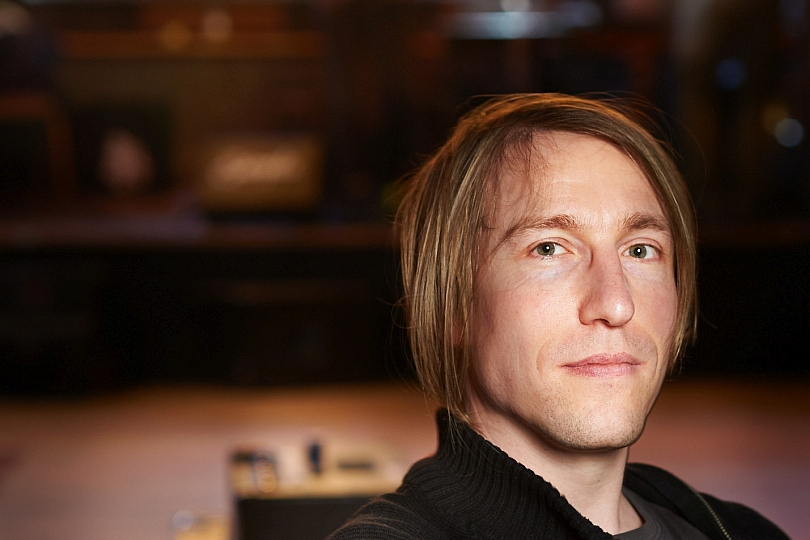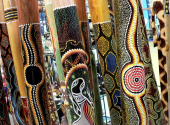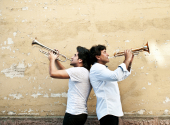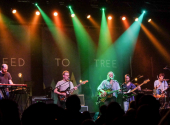
All Eyes on Germany with Björn Köhler: “Underground Culture in Berlin Moves to the Suburbs.”
How has Berlin's independent music scene changed since the late 1990s and which underground clubs are worth visiting today? What are the ways to get your music out to an audience when you are an indie-music artist? And why does he think it's not a good idea to invest money in marketing campaigns on social media? In this episode of All Eyes on, we talked all about this with Björn Köhler, music promoter, founder of the PR agency bangup bullet and the music agency Jumi, who has been involved in the Berlin indie scene since the noughties and was, among other things, the founder of the SoundGroundBerlin initiative.
How does one get from linguistics with a focus on psycholinguistics and other disciplines like philosophy and political science to music PR?
I am still a bit surprised that I landed at the Humboldt University of Berlin in general and made a master's degree in particular after all, because at the very beginning it wasn’t my first goal. I wanted to be in Berlin, to discover a new world—because it's such a huge city and the academic sphere was pretty new for me.
I come from a small village, I have seven siblings and I am the only one who graduated from high school. With this exam, you have the chance to study at a university. So I had this “entrance ticket” without having any particular clue, but I was always interested in languages in general, so I said to myself: “Why not linguistics?”
And why am I a music promoter now? This was totally by accident. I am not a musician, but I was always interested in music. And one day a friend of mine told me: “Hey, Björn, I know someone, he has a label and they are looking for some support, maybe you could meet him.” So I met him and he was a great guy and he said: “Ok, if you want to, you can start to do some work for our label. We have someone here, who knows everything.”
But when I started, this promised guy wasn’t there and I was all alone and had to learn everything by myself from scratch—label work, publishing stuff, running campaigns... So it was a sort of apprenticeship in the music business. But at least I had some insight concerning media, because I was a journalist at that time too. So I just changed position. Now I was on the other side of the table and generated the press content.
Well, I did this quite for a while and in my spare time I also started to organise, to book and promote concerts, because I have always liked to support other people, especially artists. Then I did PR for these events as well and after a while, I figured out that there are guys called “media promoters” or “publicists,” and that they can make a living from that! (laughs) For me, it was only a small part of my daily work or something I did in my spare time, but to get paid to do just that? Wow!
So I started bangup bullet, where I did (and still do) TV, radio, print and online media promotion for independent artists. I am part of the indie ecosystem for a long time and in my point of view the more efficient way for indie artists to get more known—if they chose to use this traditional way—is through radio and online promotion. TV and print are rather for better-known artists and bigger brands.
Could you compare how the music scene and the music industry have changed, since when you studied in Berlin and nowadays?
I started to study here in 1999. I think I missed the best period, which was after the wall fell down. It would have been a really great time, but I was a bit too late. (laughs) But it was still fascinating because Berlin is always kind of “under construction“ and back then it was even more like that. And we had this commonly shared punk approach.
There were more places in the city centre, very arty and strange. And now some of these interesting, spectacular places are more in the suburbs. Back then I founded an initiative called SoundGroundBerlin and one aim of this initiative was to discover those hidden treasures of underground places, to make them more known, and to bring artists there too.
Can you name some of those good, hidden places?
For example TIEF—a kind of a cellar with a pillar directly in front of the stage (laughs)—at the beautiful place Zukunft am Ostkreuz. There you’ll find the open-air cinema Pompeii, the Berlin Ringtheater, a jazz and folk bar, a piano salon, a picture hall, a pub and in summer a beer garden and an open-air stage in their forest garden.
They even have their own brewery! All in one place in Friedrichshain, only six stone's throw away from the Ostkreuz train station. They currently fight to get the right to stay there longer. And I wish and hope they’ll succeed.
And another spot was the Edelweiss in Kreuzberg at the northern border of Görlitzer Park, “Görli” as Berliners call it. It was located in a former train station. And on the first floor, they had a kind of a small vintage bar with a great atmosphere (the club is unfortunately closed since 2019, author's note).
I also organised a showcase festival at the more well-known venue Gretchen. It is also in Kreuzberg but more in the middle of it, in the former stables of the Prussian Dragoon Regiment. And architecturally with their beautiful cross vault and the filigree columns, it’s really impressive. And I like this transition of function.
Back then there were these military horses chewing their hay, and now you have this spectacular peaceful—but not quiet, on the contrary!—space for artists and their incredible shows, and us. (laughs)
Sometimes we preserve or protect those special places... But in general, it’s the same everywhere. You have a city centre and then there comes money and those public spaces as venues, clubs etc. have to move. For example, the lack of affordable rehearsal rooms is a big problem in Berlin right now.
But I am not a person who is crying about such movements, because to try to preserve something forever is futile. I rather embrace change and transformation. In a sense, not worshipping the ashes, but passing on the flame. Even at the price of losing something precious.
On the other hand, you can always find new places—there isn’t any lack of culture here in Berlin. (laughs) Maybe it’s even better that it’s moving out of the centre because not many people live in the inner-city.
For example, I lived for a couple of years in Marzahn at the eastern border of the city and you can say back then, from a cultural point of view, nothing grabbed my interest there. But there were lots of people and if you maybe had started something special there, they wouldn’t have to travel such long ways to enjoy inspiring and stimulating culture—including me.
Speaking of Marzahn, I checked some bands who you worked with through bangup bullet, and I remember, that for example, Astral Tide are directly from Marzahn—that “Plattenbau suburb”...
You’ve been very diligent! Yes, I worked with Astral Tide. They have changed their name into Dark Patterns now, but yes, they are from Marzahn or at least they lived there. And I love their music. It’s a special mix of shoegaze, post-punk, metal... Something you don’t have the chance to listen to that often.
So how can bands get this wider attention? What is for example your opinion about showcasing?
This is always a big challenge. But there’s always a way to do it. Well, you can try it in a smart way, or in a way which is too exhausting. First of all, it’s important to think about yourself: who you are, what are your characteristic aspects and how you can promote them in an efficient way. It’s definitely the better way. Normally you start a band and hustle around to get some attention and then you maybe start rethinking your methods... (laughs)
Before when you start, you can think: “What’s our artistic profile? Our identity, our attitude... And how can we show this?” It’s also good to think about which parts are good—because not everything is suited for presentation. (laughs) So we have this identification and the differentiation part. What someone can hear or see, and the seeing part is really important. Nowadays everything runs through displays, screens and monitors, which doesn’t work for music that much, because you can’t really see music itself, which is a structural disadvantage.
But if you do this kind of homework, I am quite sure, you are gonna be better prepared. And if you always think about your recipient, then you are in a good way. Kind of my motto is: “Make it personal.” It’s not just about checking up your bio etc. If you wanna reach out to people, think about them... him... her... any gender. Where their “ears and eyes” are, at which places. Then you can set your goal, choose a strategy and start a campaign. The whole plan in short catchphrases? Goals, ways, measures.
And I know this is very demanding. Speaking about audience, you can break it down to target groups, and finally just to a music-interested person that maybe become a fan. And I think it’s better to think about a “person” than about a “consumer”. Some artists treat their audience more like consumers: “Buy this, buy that, come to us, there’s a concert, next concert, next single...” But when you are a person, you like to be treated like one and you like to get some attention, maybe to get the chance to catch some really nice and special goodies and you like to be a bit entertained as well, right?
Ok, how does someone get, for example, your own attention as a music promoter, next to the presentation?
Haha, to get my attention isn’t that difficult. Ask me, send me your music and then I decide, if it makes sense to run a campaign for this specific release. And that’s it. It’s really like that, I don’t promote everything. If I have the impression: “Ok, this won’t work” and if your efforts and costs—not mine—are not well balanced with the chances of getting adequate results, then I say no.
Even if it sounds maybe strange at first, but I think this response is nevertheless quite helpful. Because traditional media is maybe not the right channel for you. For indie bands this is quite often not the right ecosystem. So just start digging and try to find the right places, where you can find your eyes and ears.
And if it’s a “yes” and you decide to work with me, well then we can do the profile shaping stuff combined with a fitting presentation and so on together.
Ah, one important thing concerning the platform where you find the “right eyes and ears”: don’t pay for marketing on Facebook, Instagram etc. First, because like I said before: Here we have this structural disadvantage of music. People have to press some kind of play button first. And this is a huge barrier.
And second, sometimes some of these marketing activities might work, but it isn’t sustainable. For example Spotify playlist promotion: a lot of playlist promoters do a good job, but it’s quite expensive and if you have 200-300 listeners per month and in four weeks it jumps up to 10 000, then you have this “wow” feeling and you think: “Ok, now I can reach the stars.” But four weeks later you are back on earth again with your 200-300 listeners monthly.
The same is with advertising on Facebook or Instagram. Maybe it works if you have a concert and you have this local or regional connection. But it’s better to spend some time and energy and the saved money to educate yourself and work with helpful tools that are out there. And the good thing is: you have everything under control because you can do it by yourself.
bangup bullet provides mostly media promotion, whereas Jumi is something like an “all inclusive”: a record label, music publisher and management agency. Was it your dream, to have an agency, which offers everything in one package?
Yes, because that’s where I come from. I started at a record label, then we made a publishing company out of it too, and then it was also a sort of consulting agency... and I loved that! It was quite exhausting because I had to do it all by myself from the get-go. But step by step I gathered a wonderful team around me. It was a great time and I was really sad to stop doing it because I focused on bangup bullet. But as a media promoter, I can see all the time that something like Jumi can be quite helpful.
Is it also better for musicians to have everything “in one package”?
You know, you can always release music by yourself, without a record label nowadays. But if you choose to work with a “normal” independent record label, they maybe pay the pressing plant, if at all, and release the production via a digital distributor. And that’s it. And I don’t blame them for that, because you can’t earn much money in these times by selling music.
So they can’t afford to pay a professional publicist nor to run expensive marketing campaigns for you. But I do media promotion and for me, it’s not such a huge thing to run a campaign. As an artist, you actually need someone to do this. You can’t do all this by yourself. Furthermore to do media promotion, especially for independent artists, is always a huge challenge.
Concerning music publishing and the world of licences, royalties and pay-outs it’s better to have expertise, experience, and some kind of idea, where the partners are to reach out. Because that is where the money is actually
But the publishing world is quite far away from indie artists. They don’t think about it that much in terms of income. They think about Spotify to get listeners. This can be a good promotion channel, but there’s no money, no income. There are really other places. You just have to find them. But you maybe need some kind of guidance, I think.
Or you can just for example use Google and do some research first. The knowledge is out there for free. Educate yourself, shape your profile and your presentation, and become a better artist, a better musician.
Maybe you’ve heard something about this guy before. His name is Ed Sheeran. He has this “shit theory”: “At the beginning your skills and your music are shitty. So you have to practise at least 10 000 hours. Then the water comes and flushes the shit away. And then, with some luck, comes the good stuff.” But for an artist, it’s also difficult to evaluate, whether what you are doing is good enough for the audience you want to reach. This is part of your education as well—to ask other people about their opinion. The best is not to ask your family or friends.
You can reach out to people on the street, in parks or elsewhere. Or to people from the music business: bookers, promoters, publishing agencies, labels... And just listen to their comments. There you can get quite helpful hints, for free.
You say the genre is not the crucial factor for you to start working with certain artists. What are the key qualities you are looking for?
The music itself. Because the rest we can do together. This is part of my job. We can work out the right concept, and a fitting presentation, we can search for “what’s your story” aspects. We can check what could work and what won’t. But the most important thing is the music.
Because we have to convince journalists, that this is really the right stuff for their media outlet. So it has to have good quality, both in terms of a singer-songwriter way and also production-wise. If the production is not good enough, you can’t play it on the radio, it’s quite that simple.
How realistic is it for an independent artist to do music as a full-time job in Germany nowadays?
It’s nearly impossible... (laughs) But actually, it is possible, it depends on your strategy. I have mentioned a lot of it already in this interview, but in general—you need to be well prepared at the very beginning. Then you start to figure out what your channels are gonna be and so on. There is this saying: “Planning without execution is mostly useless—execution without planning is mostly fatal.”
And there are also other ways of making income, for example, your copyrights. I have the impression, that nearly no singer-songwriter thinks about that. About the composition and the lyrics from that perspective, to get some money from the licences and royalties. Maybe they think about getting money from playing live, but there are some other possibilities: composing songs for others, going into music production as a session musician, etc.
And always remember: Artists like Ed Sheeran and all the other stars have one thing in common. They were unknown at first. So they were in the same situation, maybe just like you now. Just do your homework, practice—maybe 10 000 hours isn't really necessary—flush the shit away and hit us with massive music!
What are your favourite clubs and venues in Berlin to discover new music?
Well, here's the list: Schokoladen, Kottimonarch, Kastanienkeller (Radar Squat), Badehaus, Panke, Køpi, Supamolly, Villa Neukölln, Klunkerkranich (this place is already more known), TIEF as part of Zukunft am Ostkreuz, Gretchen.
If you have found an error or typo in the article, please let us know by e-mail info@insounder.org.





